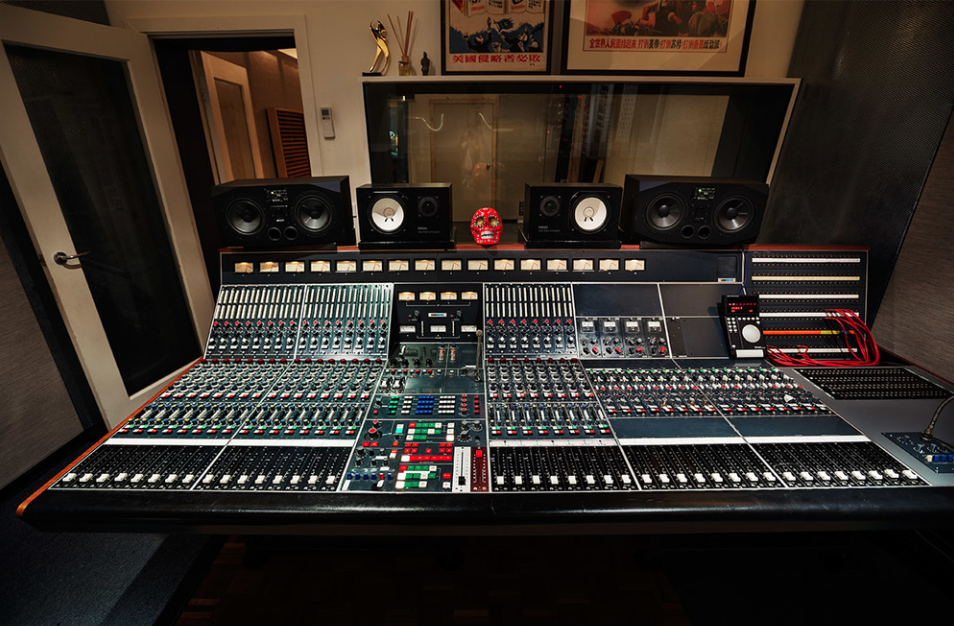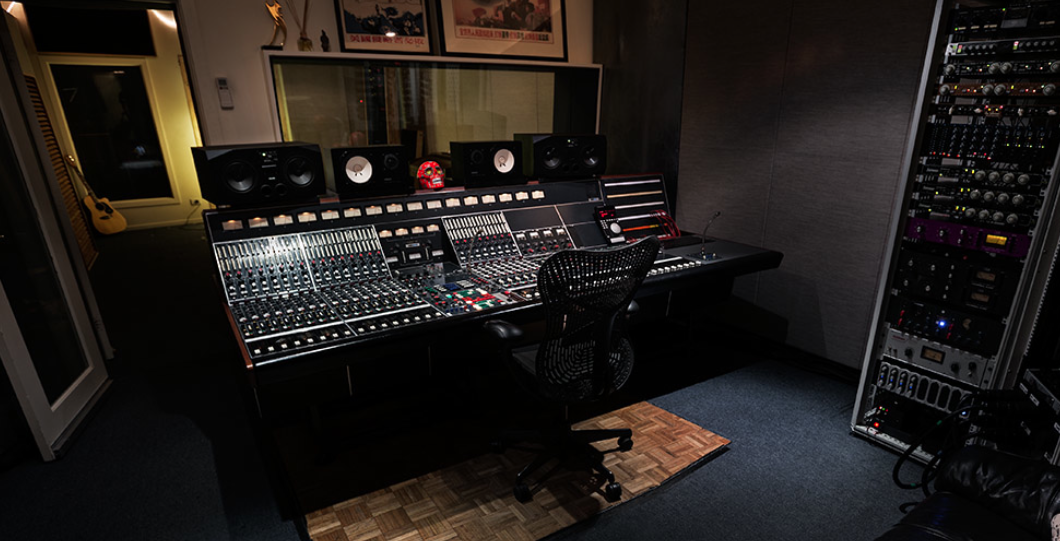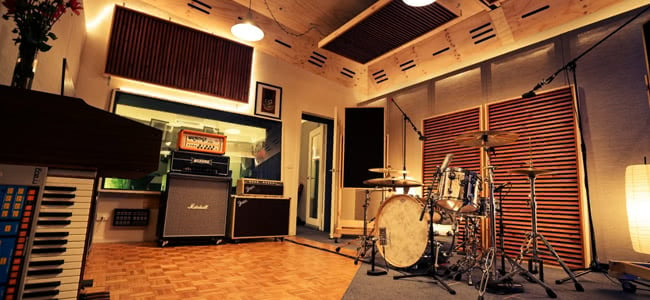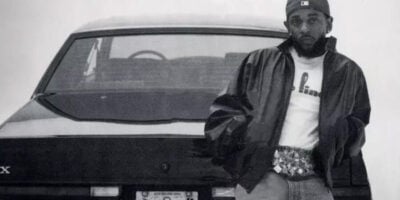For those uninitiated The Studios In The City is a Recording and Production Facility located in Brunswick, Melbourne and operated by producers Samuel K and Tom Larkin. The Aussie music institution housed the likes of Bodyjar, The Getaway Plan, Shihad, Dream On Dreamer, Closure In Moscow, Strangers,Calling All Cars as well a birthing High Tension’s 2014 ARIA-nominated album Death Beat.
 As well as being a producer, one half of Studios In The City, Larkin is also a Manager, Drummer and Songwriter, and is a founding member of New Zealand hard rock band Shihad. With an incalculable amount of experience and knowledge under his belt on both side of the production desk, Tom has kindly penned a handy guide for any upcoming muso on how NOT to be a dickhead in the recording studio.
As well as being a producer, one half of Studios In The City, Larkin is also a Manager, Drummer and Songwriter, and is a founding member of New Zealand hard rock band Shihad. With an incalculable amount of experience and knowledge under his belt on both side of the production desk, Tom has kindly penned a handy guide for any upcoming muso on how NOT to be a dickhead in the recording studio.
He will also be performing on Saturday the 11th of July at The Corner Hotel as part of a very special one-off Shihad hosted ‘The Dead Of Winter’ show, with support from King Of The North and Captives tickets and info at www.corner.com.au. (Photo credit: Kane Hibberd)
Caring Too Much About The Gear List
With the recent proliferation of online learning resources in audio engineering / production and mixing, we are now seeing the rise of musician as audio technology train-spotter. Many of them are now well-versed in what latest fashionable pre amp or recommend buss compressor is being discussed on sites like Gearslutz etc. Granted, this can often be a fantastic resource in learning and refining your understanding of the reasons why certain gear is favoured – but using it as an absolute in choosing a studio to work in leads to a false understanding of what this equipment can bring to the table and often strange biases as to what is ‘acceptable’ gear to use.
The bottom line is this – there are many great songs and albums that, to be honest – don’t sound the best, or for that matter don’t even sound that good at all. But what they do is resonate and connect – they have captured spirit.
Conversely I have heard shit tons of albums that sound impeccable, massive soundstage, huge bottom end, recorded on the Neve that George Martin had built out of the ashes of Jimi Hendrix’s cream stratocaster. Mixed on the SSL that was used to mix Nevermind. Mastered by the guy that has the most blinking lights on the east coast of the USA … and once you listen to it? It’s about as emotionally affecting as a white paper outlining asphalt degradation in Sydney’s North Shore during the 1930’s.

What makes an album great? Great songs, great artists and a great team. After that you can split hairs on which Neve module is best for the 18th harmony vocal layer on the 537th bar…
Case in point – you know a lot of those first albums? The ones that made you fall in love with the band? They were often recorded really fast with limited budgets and captured an act and a production team pushing themselves really hard in a cheap studio and the whole thing was all the better for it.
Bringing The Home Recording Mindset To The Studio
We have moved into an era where an artist is judged more by the quality of their ideas and concepts as opposed to overt displays of technical skill. Access to recording is now democratised and despite what someone like Steve Albini may say on the matter – I think this is actually a great thing.
But what has transpired is that people can now easily make something at home that sounds glossy and highly produced, using techniques that were previously only available to those who had mega budgets and specialists to help them do it.
Musicians with half a clue can now leverage time at home to perfect and layer things to such an extent – with technology like AXE FX and tools like Beat Detective, Auto Tune and the litany of drum sample libraries – that what was once called ‘Overproduced’ is fast becoming synonymous with the aesthetic of ‘Cheap Bedroom Recordings’
[include_post id=”428105″]Now I’m no luddite and I love a sample stack on a kick as much as the next person who owns 2 x 300 watt subs chained together in their monitoring, but this situation has given rise to bands seeking out the things that a decent recording studio is naturally setup to do far better than a home setup.
If an artist wants to stand out and cut through the noise in this day and age, they are going to focus on capturing ‘real’ and create a unique sonic narrative around their recordings.
This involves things like recording live drums, or the whole band live in a room together and going for performance rather than chopping the shit out of it to feel ‘correct.’ Using real amps and character pieces, recording things and leaving the edges, shabbiness and mistakes that show it could only have happened between real people in a real room with real ability and skill – this is what stands out nowadays as being desirable and is the new ‘High budget / High Production.’
Often times you will come across an artist who wants to use all of the real stuff, do it at a high level, record everything really well and then proceed to take it home and beat the life out of it with computer editing, a stack of well-worn samples and polish it within an inch of its life in order to feel secure that they have made it sound ‘professional’ and ‘correct.’
Each to their own – I actually dearly love some really slickly produced shit – but if an artist is really only interested in sounding the same as everyone else – they may as well save themselves the cash and grief and do it at home.
Avoiding Pre-Production
Far and away the biggest mistake any artist makes is to focus on the recording itself, as opposed to working on the material to be recorded.
Let’s make one thing really clear: material that is well arranged, crafted and played with intent can be recorded, mixed and produced at far greater speed, lower cost and with better results than turning up to the studio with no work done on the songs and arrangement.
Good songs and great arrangements just fucking sound better.
Pre-production and writing is critical on every level – seeking no feedback or reflection in the songwriting process and expecting to record it with the hope that expensive gear, lavish studios and mixing will do the work for you is setting the project up for a less than optimum outcome at best – and shooting yourself in the foot at worst.
Not Letting The Process Unfold
There is another extreme of course, and that’s when bands turn up to the studio with a mindset of how the songs are rigidly cast in stone – they’ve mapped out what sounds are to be used and have every possible option tied down so there is no room or flexibility to allow the environment and process shape the recording.
Now whilst not being religious myself – I do have and have multiple experiences in the power of collective consciousness and the ability of music to focus and generate transcendence. I always reflect on this quote: Quincy Jones once said to Michael Jackson, “If a song needs strings, it will tell you. Get out of the way and leave room so that God can walk in.” He later rephrased this to “You’ve got to leave space for God to walk through the room.”

A lot of the best records I have been a part of have been a snapshot of a time and place. The recording itself has a strong flavour that could only have happened between the people involved and the place they did it – this is what gives a recording character. The more you allow yourself to be open to this (once you have tied down those arrangements and songs) the more you allow the record to take on a life of its own.
Whatever your beliefs, you can approach writing and recording from the point of view that everything is a rational, conscious thought process, or you can leave a little bit of room for something unexpected to come in and add its random influence.
Fighting About The Wrong Stuff
Every band fights. Every band should fight. It needn’t be antagonistic, but chances are when you have committed, passionate and forthright people working on the same project, different ideas can become the catalyst for deep-seated resentments coming to the fore and artistic clashes of epic proportions.
As with anything in life – it’s the actually the quality of the argument that matters and in the recording process there are really only two types of arguments:
– Arguments about ideas
– Arguments about agendas
The albums that are a joy to work on can involve impassioned conflicts every day – and certainly that is not restricted to the band themselves – but so long as they are focused on the best idea winning out, by and large it’s a positive cause – people who give a fuck will always fight for the best result.
But arguments about agendas are a different story – these are by and large destructive and unproductive. This involves band members with differing ideas about the project outcome, the process, who’s responsible for what, how much time they are prepared to dedicate, how much money is spent and who gets what out of it, what direction the album is headed in, how to do it and of course whether a distorted djembe overdub is worth any song royalties…
The obvious plan is to involve a referee – as in, a producer – but they too are prone to these issues and it can bring a project to its knees if everyone is not on the same page.
The best solution is to pick your production partners and band mates carefully and try to resolve any obvious internal conflicts or divergent manifestos before you start recording, to make sure that everyone on the project is really only fighting for the best result and nothing more.
If you’d like to know more about Tom’s recording studio, The Studios In The City visit their incredibly slick website www.thestudiosinthecity.com.
Shihad’s ‘Dead Of Winter’ Show
Saturday July 11th
The Corner Hotel
w/ King Of The North and Captives
Tickets and info at www.corner.com.au.


































